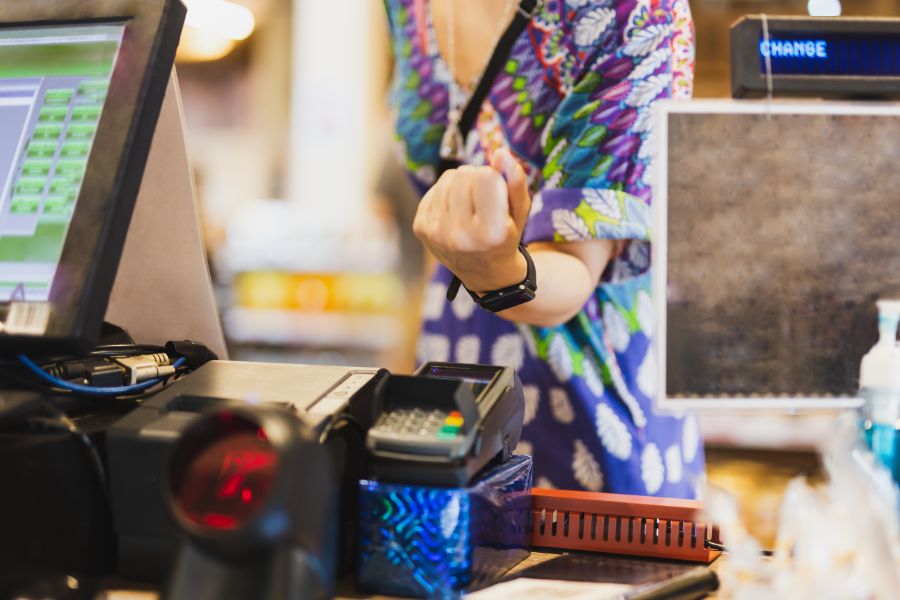Choosing the right convenience store point of sale software can be a game-changer for your business. This detailed guide will help you navigate the complex landscape of POS solutions, focusing on the unique needs of convenience stores. We’ll break down different pricing models, explore essential features, and provide practical advice to ensure you find a system that not only fits your budget but also enhances your store’s efficiency and customer service.
3 Types Of Convenience Store Point Of Sale Software
In the dynamic world of convenience stores, point of sale (POS) software plays a pivotal role in streamlining operations, enhancing customer experiences, and driving business growth. As technology advances, a variety of POS solutions tailored to the specific needs and preferences of convenience store owners have emerged.
Traditional/On-Premises POS System
Traditional or on-premises POS systems, a long-standing staple in the retail industry, are installed directly on the store’s hardware. These systems operate locally, store data on-site, and require dedicated servers and infrastructure. Convenience store owners typically invest in hardware components such as terminals, cash registers, and barcode scanners, along with software licenses.
Advantages:
- Robust functionality: Owners can customize the software with features like inventory management, sales reporting, and customer relationship management.
- Control over data: With data stored on-site, owners have full control over their security and access.
Disadvantages:
- High upfront costs: These systems often come with significant initial expenses for hardware and software, plus ongoing maintenance costs.
Cloud-Based POS System
Tablet or smartphone-based POS systems represent the latest innovation in convenience store point of sale software, leveraging mobile devices as the primary interface for sales transactions. These systems are especially suitable for small convenience stores, food trucks, or pop-up shops due to their portability and ease of setup.
The adoption of cloud-based POS solutions is rapidly increasing; the global market was valued at $2.24 billion in 2020 and is projected to grow to $13.24 billion by 2028. This trend corresponds to a robust compound annual growth rate (CAGR) of 24.5% from 2020 to 2028.
Advantages:
- Real-time data access and updates: Owners can monitor sales and inventory levels from anywhere, which significantly enhances operational flexibility and efficiency.
- Cost efficiency: Initial costs are reduced as there is no need to invest in extensive on-site hardware.
Tablet/Smartphone-Based POS System
Tablet or smartphone-based POS systems represent the latest innovation in convenience store point of sale software, leveraging mobile devices as the primary interface for sales transactions. These systems are especially suitable for small convenience stores, food trucks, or pop-up shops due to their portability and ease of setup.
The transaction value of mobile POS payments is forecasted to grow significantly, with an expected annual growth rate (CAGR) of 12.76% from 2024 to 2028. By the end of this period, the market is anticipated to reach a staggering $6.11 trillion.
Key Factors Influencing Cost Of Convenience Store Point Of Sale Software
When selecting a point of sale (POS) system, convenience store owners must consider various factors that impact both the initial and long-term costs. Understanding these factors ensures that the chosen system not only fits the current financial situation but also aligns with future business growth and needs.
Hardware requirements
The hardware necessary to run the POS software, including terminals, scanners, and printers, significantly determines the initial investment required. Selecting compatible hardware with existing infrastructure can mitigate costs, allowing store owners to use current equipment and avoid unnecessary purchases.
However, if the existing hardware is outdated or incompatible, additional expenses for new equipment will be required, affecting the overall budget.
Software features
The range and sophistication of software features directly influence the cost of a POS system. Basic functionalities like inventory management and sales tracking are typically included, but advanced features such as employee management and loyalty programs usually come at an extra cost.
These advanced capabilities enhance operational efficiency and customer satisfaction, crucial for business growth. Store owners must carefully assess their specific business needs and budget constraints to determine if the benefits of these additional features justify the cost.
Scalability and Customisation
Scalability is essential for a POS system as it ensures the software can grow with the business. A scalable POS system can handle increased transaction volumes and additional store locations without compromising performance, supporting seamless business expansion.
Furthermore, customizable solutions allow store owners to tailor the POS system to meet unique business challenges and opportunities, setting them apart in a competitive market. Investing in scalable and customizable software helps convenience store owners future-proof their investments and sustain long-term growth.
Payment Processing
Payment processing fees are crucial to the overall costs associated with convenience store point of sale software. These fees include transaction rates and processing charges, which are vital as they directly impact the profitability of the store.
When selecting a POS system, store owners can choose between integrating with external payment processors or using built-in payment solutions, each offering different fee structures and levels of flexibility. Understanding these fees and how they integrate with the POS system is essential for store owners to optimize cost-effectiveness and align with their business objectives.
Additional costs
In addition to the initial software purchase, convenience store owners must consider other associated costs. These include setup fees, which are necessary for installing and configuring the POS system tailored to the store’s specific needs.
For larger stores, licensing fees for additional users or terminals may apply. Ongoing maintenance charges must also be considered, which are crucial for ensuring the software’s functionality and security.
Awareness of all these potential expenses is vital for effective budgeting and financial planning.
Training and Support
Effective training and comprehensive support are key to successfully implementing a POS system in convenience stores. Training ensures that all employees are proficient with the system, which helps minimize errors and maximize efficiency during transactions.
Convenience store owners should evaluate the training and support options provided by POS system vendors carefully. Investing in a robust training program and dependable ongoing support can significantly enhance the system’s utility and longevity, thereby aiding in the overall success of the store.
Integrations and Add-ons
Integrating with other software or add-ons, such as accounting systems, e-commerce platforms, or loyalty programs, greatly enhances the functionality of convenience store POS systems.
These integrations allow for streamlined operations by syncing data across platforms, automating tasks, and providing a seamless experience for both employees and customers.
For instance, integration with accounting software automates the updating of sales data, simplifying financial reporting and inventory management. Similarly, e-commerce integration expands the store’s sales channels, while loyalty programs help build customer loyalty and encourage repeat business.
Why You Should Choose ConnectPOS In Considering The Pricing Of Convenience Store POS Software
When considering the pricing of convenience store POS software, ConnectPOS stands out as the optimal choice for several compelling reasons.
- Transparent and cost-effective solution: ConnectPOS distinguishes itself with a clear pricing model devoid of hidden fees and transaction costs. This transparency ensures that you can budget effectively, optimizing your operational costs without sacrificing quality.
- Robust inventory management: Take control of your inventory with ConnectPOS’s real-time tracking and intelligent stock alerts. This feature ensures optimal stock levels, reducing costs and enhancing customer satisfaction by ensuring popular items are always available.
- Sales reporting & analytics: Utilize ConnectPOS’s detailed analytics to refine your business strategy. Adjust your inventory based on consumer trends and behaviors, gaining a significant competitive advantage in the marketplace.
- Multi-store administration: Manage multiple locations effortlessly with ConnectPOS’s unified system. This allows for consistent customer experiences across all stores, simplifying operations and maintaining quality.
- Fully customizable workflows and product options: ConnectPOS offers extensive customization options, from modifying product details to personalizing receipts. Tailor the shopping experience to meet customer preferences and highlight key sales drivers.
- Streamlined staff management: Optimize staff performance with features for smart shift scheduling and sales tracking. This ensures high productivity and superior service quality, enhancing customer interactions.
- Convenient self-checkout: Reduce wait times and improve customer satisfaction with ConnectPOS’s self-checkout feature. This modern solution caters to customer preferences for efficiency and convenience.
- Mobile payments and e-receipts: Support mobile payments and digital receipts to facilitate a smooth checkout process. This not only speeds up transactions but also supports eco-friendly practices.
- Integrated reward programs: Easily set up diverse promotional offers directly within the POS system, from discounts to ‘buy one, get one free’ deals. This helps build customer loyalty and encourages repeat business, contributing to long-term success.
- Complete POS integration: ConnectPOS offers a fully integrated solution that combines inventory management, payment systems, and sales operations into a cohesive platform. This integration enhances overall efficiency and customer satisfaction from inventory management to checkout.
- Tailoring POS to fir your store’s unique demands: ConnectPOS can be tailored to meet specific requirements, whether it’s unique product categorizations, compliance with local digital receipt regulations, or any other specialized feature needed to support your store’s growth.
FAQs About Convenience Store Point Of Sale Software
- How is convenience store POS software pricing typically structured?
Convenience store POS software pricing often follows a subscription-based model, where businesses pay a monthly or annual fee for access to the software and its features. Pricing may vary depending on factors such as the number of store locations, the volume of transactions, and the level of support and customization required.
- What features are usually included in convenience store POS software?
Convenience store POS software typically includes essential features such as inventory management, sales tracking, and customer management. Additionally, advanced functionalities like barcode scanning, integrated payment processing, and loyalty programs are commonly offered to streamline operations and enhance the customer experience.
- Are there any additional costs associated with convenience store POS software?
While the base subscription fee covers most features, there may be additional costs associated with certain add-ons or integrations, such as online ordering platforms or accounting software integration. It’s essential to clarify with the POS provider to understand any potential extra expenses upfront.
- Can convenience store POS software pricing be customized to fit specific business needs?
Yes, many POS providers, including ConnectPOS, offer customizable pricing options to accommodate the unique requirements of convenience store owners. Whether you operate a single store or a chain of locations, the pricing can be tailored to align with your business size and needs.
- Are there any hidden fees or long-term contracts associated with convenience store POS software?
Transparency is key when evaluating POS software pricing. Reputable providers like ConnectPOS are upfront about their pricing structure, ensuring there are no hidden fees or surprises. Additionally, they offer flexible contract terms, allowing convenience store owners to scale or adjust their subscription as needed without being tied down by long-term commitments.
Conclusion
In conclusion, convenience store point of sale software pricing encompasses a multitude of factors, from hardware requirements and software features to scalability, payment processing, and additional costs. By understanding these key considerations and evaluating the various types of POS systems available, convenience store owners can make informed decisions that align with their business needs, budget constraints, and long-term goals.
To learn more about ConnectPOS’s solution for your convenience stores, feel free to contact us!



